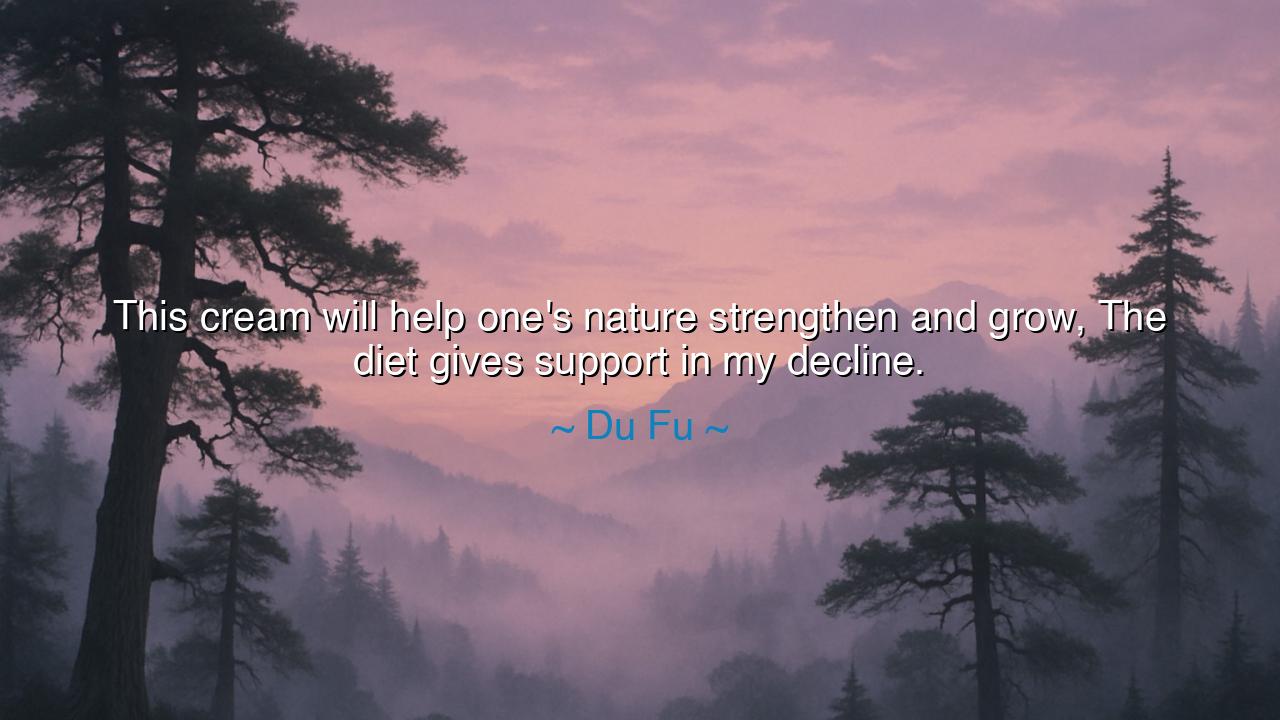
This cream will help one's nature strengthen and grow, The diet
This cream will help one's nature strengthen and grow, The diet gives support in my decline.






In the quiet twilight of his years, the sage Du Fu wrote, “This cream will help one’s nature strengthen and grow, the diet gives support in my decline.” In these few words lies the heart of all ancient wisdom — the understanding that the body and spirit are bound as one, and that nourishment, rightly chosen, becomes both medicine and meditation. It is not merely food or ointment that Du Fu praises, but the gentle restoration of life’s balance, the recognition that even in decay, there can be growth; even in weakness, there can be grace. He writes not as a physician, but as a poet who feels the tremors of mortality, yet still seeks harmony with the eternal rhythm of nature.
Born into the turbulent years of the Tang Dynasty, Du Fu lived through famine, exile, and the crumbling of an empire. His health, like his homeland, often failed him. Yet in this frailty, he found clarity. The cream he speaks of may well be a medicinal balm — one of those herbal mixtures beloved by the healers of his time — but its meaning runs deeper. It is a symbol of renewal, a way of saying that gentleness and care can mend what hardship has worn thin. In the same way, the diet he mentions is not only sustenance for the body, but also an act of discipline and reverence — the daily practice of choosing life, even in decline.
In the world of the ancients, to strengthen one’s nature was the highest goal. “Nature,” in this sense, was not merely the flesh, but the innate essence — the qi, the life force, the spiritual current that flows through all things. The sages of old taught that this essence could be preserved through harmony: moderation in food, serenity in thought, and compassion in deed. Thus, Du Fu’s “cream” and “diet” are not luxuries, but acts of devotion — offerings to the sacred temple of the self. His words remind us that healing begins not with wealth or youth, but with attention, with the small and deliberate rituals that sustain life’s quiet fire.
There is an echo of this wisdom in the story of Toyotomi Hideyoshi, the great unifier of Japan. In his later years, when power and glory had already adorned his name, his body began to fail. His physicians offered him rich meals and tonics to restore his vigor, but he refused them all. “The emperor’s path is not the path of excess,” he said. “To rule well, one must eat simply.” He returned to plain rice, vegetables, and miso broth. And though his strength did not return in full, his mind grew clear and his heart serene. Like Du Fu, he learned that true restoration does not come from indulgence, but from humility before nature’s law.
Du Fu’s reflection is, in truth, a lesson for all who age — and all who live. We are so quick to seek miracle cures, to chase youth through powders, pills, and promises. Yet the poet reminds us that the real elixir lies in care and consistency — in feeding the body as one would feed the soul, with respect, simplicity, and gratitude. Even as the body declines, the spirit can grow stronger; even as the flesh weakens, wisdom and compassion may bloom. Thus, decline is not defeat — it is transformation.
To live by Du Fu’s teaching is to honor the seasons within oneself. In youth, we burn bright and fast; in age, we must learn to nurture the embers. Let the cream represent all acts of kindness to the body — rest, warmth, movement, and tenderness. Let the diet represent discipline, moderation, and gratitude for the gifts of the earth. In doing so, we do not fight against time, but walk with it, hand in hand, until the end feels not like loss, but completion.
So remember, traveler of this fleeting life: do not despise the slowing of your step, nor curse the lines upon your skin. Follow Du Fu’s wisdom — strengthen your nature through care, support your decline through gentleness. In this way, your days will not merely lengthen; they will deepen. For the true measure of vitality is not how long the flame burns, but how steadily it lights the dark.






AAdministratorAdministrator
Welcome, honored guests. Please leave a comment, we will respond soon